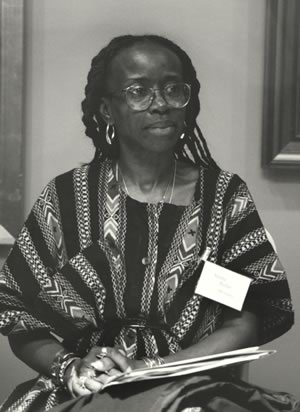Mattie Butler
As a child, Mattie Butler took to heart a proverb she learned from her parents: “Things that you do, do with your might. Things that are half done are never done right.” Now she works 16-hour workdays at her job as Executive Director of WECAN (Woodlawn East Community and Neighbors), a community-based organization which creates jobs, education, housing, and recreation for thousands of Woodlawn East residents of Chicago. On the weekends, as a singer in the band of her eldest brother, Jerry “The Iceman” Butler, her eldest brother, she travels to gigs in Washington, D.C., New York, and the Rock and Roll Hall of Fame in Cleveland, Ohio. Mattie Butler does things with all of her might.
The granddaughter of sharecroppers from Mississippi, Mattie, her three brothers and two sisters, grew up on the north side of Chicago. “We were a singing family,” Mattie explains. “We didn’t have one of those big old chunky black and white TVs; there were only a few in the neighborhood. So as a family unit we did a lot of singing—religious stuff, lots of gospel.” Her parents were always helping someone out and constantly spoke of the importance of a collective work ethic. “I grew up feeling like collective work was natural, and felt out of place in the normal 9 to 5 business setting where everyone is trying to raise themselves to knock someone out.” Her paternal aunt, who ran a successful soul food restaurant, “was my mentor and close friend. She taught me that if you can’t work for somebody else, you can certainly work for yourself. You’ve just got to set the rules and follow them.”
In 1964, at the age of 19, Mattie trained with the Jobs Now project, a federally subsidized YMCA job training program. By 1969, she had worked in six different YMCA jobs from clerk to administrative assistant to job counselor. She worked with Chicago banks to help them to hire blacks for entry-level jobs. On call 24 hours a day, Mattie mentored 50 people, including many she continues to help. Exhausted after five years, Mattie was ready for a change. In 1969, her brother, Jerry Butler, convinced her to join his band as a background singer. For the next 11 years, Mattie kept the grueling hours of an entertainer and met the demands of a single mom to her daughter.
In 1980, a series of fires broke out in her Woodlawn neighborhood. One night, a huge fire two doors away claimed the lives of thirteen children. “I knew those kids, I knew those families. It could’ve been my children. I got pissed off and hurt.” She began investigating the origin of the fires and discovered that 90 percent of fires were ignited by arsonists. She decided to create an organization to help Woodlawn residents protect themselves from such destructive exploitation.
Mattie named the organization WECAN. WECAN’s mission is to address the changing needs and issues of the Woodlawn communities and its strategy is “to build from within.” To WECAN, Mattie brought the collective work ethic that she learned as a child. “Entrepreneurs need to do it all—from sweeping the floor, to taking out garbage, to book-keeping, to interfacing with the consultants and the funders. I make it a personal habit to do the work that everyone else does, because that way you build everyone’s capacity.”
Over the next 18 years, WECAN developed housing for neighbors and for the homeless, organized drug and delinquency prevention programs, started a food pantry serving over 500 people, founded a telephone answering service employing former welfare recipients, and began numerous education and support services. WECAN’s staff of eight paid employees and 30 to 50 volunteers serve up to 6,000 people a year. The staff has raised funds to send many local youths to college, and has prevented 5,420 units of housing from being abandoned.
Mattie is also a leader and board member at a mental health center, a local business association, a rehab network, a community economic development organization, a maternal and child health center, and a black women’s organization. She uses these responsibilities to expand networks, as well as to influence local and national public policy initiatives.
Mattie has been challenged by the need to solicit money to fund WECAN. “I’ve had to learn how to see asking for money as not begging and being comfortable saying, ‘Hey, I’m addressing these issues. These issues deserve money.'” Equally difficult has been how to confront members of her own community who she sees interfering with change. “There’s a taboo about fighting among ourselves,” says Mattie. “I grew up learning that you don’t put your brother down.”
Mattie Butler takes great satisfaction from witnessing WECAN’s effect on individuals. “I’ve seen people move from a place of ‘I just can’t do it’ to ‘I can do it,'” she explains. “That makes me know I’m on the right track. If we can have the brick and mortar effect in peoples’ lives, then that’s the best.”
 Photo by Dorothea von Haeften
Photo by Dorothea von Haeften